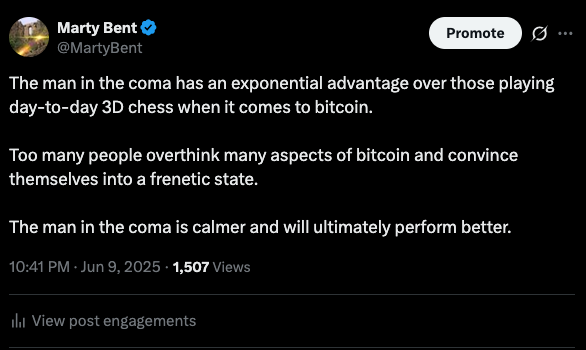-
@ TFTC (News Bot)
2025-06-10 04:02:15Marty's Bent

via me

"The man in the coma" has been a long-running archetype of a bitcoiner on TFTC and Rabbit Hole Recap. Over the years, we've referenced the man in the coma in regards to bitcoin being a backward compatible distributed network that would enable an individual, in the case of our example - a man who fell into a coma, to be able to wake up many years, even decades, after falling into a deep sleep, go back to his bitcoin node and be able to participate in the network and validate his own transactions as if the network was operating the same it was the day he slipped into a coma. As a distributed network, this is one of bitcoin's greatest value props; consistency for the individual running it, no matter the version.
Having spent 12 years engrossed in bitcoin, thinking about it every day, building a media company focused on educating people about the network and the monetary revolution it enables, why it's important and how they can use it. Becoming a managing partner at Ten31, which is dedicated to investing in companies building out infrastructure that makes bitcoin more accessible and easier to use; "the man in the coma" has become a more prominent archetype in my mind.
"The man in the coma" archetype can be described in other ways. For instance, there was an individual by the name of John Doe, who joined myself and Matt Odell on TFTC about seven years ago who went to jail for four years. He was distributing certain goods on the Silk Road for many years and got nabbed by the police while throwing a house party. Unfortunately for Mr. Doe, the goods he were selling via the Silk Road were in the house hosting the party that got busted. Fortunately for Mr. Doe, the police who nabbed him were not privy to the way in which he was marketing and selling the goods. He went to jail for four years, walked out at the end of his sentence, found his bitcoin wallets, recovered them and was more than pleasantly surprised at the magnitude of his wealth.
The forced hodl that was incited by the state throwing him in a cage wound up paying off after four years. Now, I can certainly admit that time is the most scarce asset in the world. Being put in a cage for four years or falling into a coma for a number of years is not ideal. However, there are lessons to be gleaned from the successes that have been realized by "the man in the coma" and the man who was forced to hodl by being thrown in a cage. Unable to access his bitcoin during that period of time to make less than wise decisions.
The main lesson to be gleaned is that doing nothing is oftentimes significantly more optimal than doing something. Too many bitcoiners decide to make rash decisions influenced by the day-to-day happenings on social media or some one-off comment from someone in their personal life that they respect. These comments can be about the long-term viability of bitcoin itself, some prognostications about where the price is going in a short-term to medium-term time frame or simply the social aspects of being associated with bitcoin. All of these factors play into influencing certain individuals deciding to sell their bitcoin in the hopes of buying it back lower, realizing something material in their day-to-day life or jumping off a ship that they've been convinced is about to sink.
In my mind, the only thing listed above that makes a bit of sense to me is realizing something material in your day-to-day life. Selling some bitcoin to purchase something that makes your life better like enabling you to support your family at a critical time and in a way that would not be possible unless you sold bitcoin. That makes sense to me. However, the other two are completely nonsensical. Bitcoin's success is binary. It either succeeds or it doesn't. And if you accept that this is true, success means slowly but surely becoming the global reserve currency and monetary network used by billions of humans on the planet or it goes to zero.
If the former materializes, that means that billions of people are going to be competing for 21 million Bitcoin. There are, by some estimates, $900 trillion worth of assets that are being used to store wealth over the short, medium, and long term. Bitcoin has the potential to subsume a material percentage of that $900 trillion. In my mind, if bitcoin is as good as I believe it is, it should take at least half of that market, if not 80 to 90%. This in and of itself is a gamble. No one can be certain that this will come true. And with that in mind you have to make a probabilistic bet by surveying the world and discerning what the likelihood of bitcoin's ultimate success is.
If you think governments, central banks, and large corporations are going to continue down the path of unfettered expansion of the monetary base, debt, and misallocation of capital, bitcoin, a peer-to-peer distributed cash system that cannot be controlled by any individual. corporation, country, or central bank makes a lot of sense. The debasement, the debt expansion, and the misallocation of capital are driven by fallible humans working in incentive structures that are vulnerable to the fallible nature of the humans working within them.
Human fallibility brings with it the ability to talk oneself out of a position that one knows makes sense and is logical. This is the disadvantage that those who are not "the man in the coma" or "the man in a cage" operate from. Being forced to hodl bitcoin is already and will increasingly be seen as a relative advantage. Many who are in bitcoin today, paying attention to every headline, every pull request and every doubt flung their way will likely get to 2030 and agree that they made worse decisions than the man who was thrown in a cage or who slipped into a coma.
Of course, this isn't a fair introspective conclusion. The man in the coma and the man who was forced to hodl because he was put in a jail cell did not have a decision at the end of the day. Both were forced to hodl due to external or internal forces that, all else being equal, they would prefer not have had to endure. However, the outcome of these two situations will likely be better than the outcome of "the man in the arena" who thinks that by making decisions on the go as a slew of information comes his way on a day-to-day basis will materialize in a larger stack of satoshis.
The reality of the situation is such that no one truly knows where bitcoin is going to go on a day-to-day, month-to-month, or year-to-year basis. Especially at this point with large institutions, nation-states, corporations, and individual states getting into the fray. The only tried-and-true strategy within bitcoin over the long term is to stay humble, stack sats, and hodl like you are "the man in the coma" or the man who was thrown in a cage.
Bitcoin's Volatility Won't End With Institutional Adoption
Leon Wankum challenged the popular "supercycle" narrative during our conversation, arguing that Bitcoin's volatility isn't going away despite massive institutional adoption. While acknowledging that MicroStrategy now holds over 2% of all Bitcoin and won't sell, Leon maintains that leverage will still need to be washed out. He expects another 60% drawdown at the end of this bull cycle, viewing this as a feature rather than a bug of Bitcoin's design.
"Bitcoin naturally washes out leverage, it builds resilience and we don't go through these crazy boom and bust cycles, we go through bull and bear markets and I think that's a net positive." - Leon Wankum
Leon sees Bitcoin's volatility as fundamentally different from fiat's destructive boom-bust cycles. Where traditional markets require central bank intervention to prop up failing systems, Bitcoin's regular corrections create genuine resilience. Bad actors will always enter during euphoric phases, and the subsequent washouts ensure only strong hands remain. This natural selection process, he argues, is beautiful - it's what makes Bitcoin antifragile.
Check out the full podcast here for more on real estate opportunity costs, Bitcoin bonds, and treasury company risks.
Headlines of the Day
Romania Adds Crypto Terminals to Post Offices - via X
Musk Claims Trump in Epstein Files - via X
Uber CEO Calls Bitcoin Proven Store of Value - via X
Get our new STACK SATS hat - via tftcmerch.io
Take the First Step Off the Exchange
Bitkey is an easy, secure way to move your Bitcoin into self-custody. With simple setup and built-in recovery, it’s the perfect starting point for getting your coins off centralized platforms and into cold storage—no complexity, no middlemen.
Take control. Start with Bitkey.
Use the promo code *“TFTC20”* during checkout for 20% off
Ten31, the largest bitcoin-focused investor, has deployed $150.00M across 30+ companies through three funds. I am a Managing Partner at Ten31 and am very proud of the work we are doing. Learn more at ten31.vc/invest.
Final thought...
The kids really do grow up f
